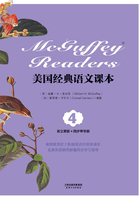
LESSON 11
TOMORROW
Mrs. M. B. Johnson is the author of “Tomorrow, ” one of a collection of poems entitled “Poems of Home Life.”
1. A bright, merry boy, with laughing face,
Whose every motion was full of grace,
Who knew no trouble and feared no care,
Was the light of our household—the youngest there.
2. He was too young, this little elf,
With troublesome questions to vex himself;
But for many days a thought would rise,
And bring a shade to his dancing eyes.
3. He went to one whom he thought more wise
Than any other beneath the skies;
“Mother, ” —O word that makes the home! —
“Tell me, when will to-morrow come? ”
4. “It is almost night, ” the mother said,
“And time for my boy to be in bed;
When you wake up and it's day again,
It will be to-morrow, my darling, then.”
5. The little boy slept through all the night,
But woke with the first red streak of light;
He pressed a kiss to his mother's brow,
And whispered, “Is it to-morrow now? ”
6. “No, little Eddie, this is to-day:
To-morrow is always one night away.”
He pondered a while, but joys came fast,
And this vexing question quickly passed.
7. But it came again with the shades of night;
“Will it be to-morrow when it is light? ”
From years to come he seemed care to borrow1,
He tried so hard to catch to-morrow.
8. “You can not catch it, my little Ted;
Enjoy to-day, ” the mother said;
“Some wait for to-morrow through many a year2—
It is always coming, but never is here.”
STUDY GUIDE
A. Word Definition
grace:simple beauty.
care:worry.
household:a group of people living in the same house.
elf:a small fairylike person.
troublesome:difficult.
vex:bother.
brow:forehead.
pondered:thought.
joys:happy things.
B. Study Notes
1. “From years to come he seemed care to borrow”: He worried much more than a young boy normally would, as though he were borrowing worry from his own future.
2. Many a year, means “many years”. Many a/an... is more formal than the single word many, and it is much less common. Many a/an... is used mainly in literary writing and newspapers.
C. Comprehension Questions
1. Who did Eddie think was the smartest person in the world?
2. What do you think “dancing eyes” means?
3. How would you explain “tomorrow” to Eddie?
D. Nicknames. “Eddie” and “Ted” are nicknames, short versions of a longer name: Theodore. Try to match the names with their nicknames.
1. Samuel a. Fred
2. Susanne b. Jackie
3. Richard c. Sue
4. Elizabeth d. Sam
5. Anthony e. Tony
6. Alfred f. Katy
7. Kathleen g. Liz
8. Jacqueline h. Dick